Tech
Union Adds Support for Arbitrum, Connecting With IBC Chains, Other L2s

July 9: Union Labs, the modular interoperability layer, has added support for Arbitrum, the leading layer-2 ecosystem by TVL, to connect Arbitrum Orbit chains with IBC-enabled blockchains, as well as other networks integrating with Union such as Polygon, Scroll and Movement. According to the team: “This integration will unlock unprecedented liquidity flow between IBC and the Arbitrum ecosystem. It will also see the reduction of the latency in optimistic cross-chain operations while maintaining the security and integrity of transactions in and out of the Arbitrum ecosystem.” (ARB)
Privado ID, Recent Polygon Spinout, Launches First Product, ‘Web Wallet’
July 9: Privado ID, formerly Polygon ID, is launching its first product since spinning out of Polygon – a “web wallet designed to set new standards for privacy while reducing user interactions by over 50%.” According to the team: “The new wallet eliminates repetitive KYC processes across platforms. Instead of nine authorization steps, users now only need 4 – meaning they no longer have to re-enter documentation like a driver’s license for every new service they log into. The web wallet will be leveraged by Verax, Consensys’s enterprise-grade SSI solution, which is relied on by projects like Gitcoin Passport and many others.”
EOracle, Hexagate Partner to Create Decentralized ML-Based ‘Gate Security Oracle’
July 9: EOracle and Hexagate have partnered to create “The Gate Security Oracle, the first-of-its-kind decentralized ML-based security protocol,” according to the team: “This system, built on the eOracle stack, will allow DeFi protocols to leverage Hexgate’s security models to protect themselves from hacks. This integration will essentially create a DeFi firewall to mitigate threats before they cause damage.” The announcement was made at the EthCC conference in Brussels.
EOracle Founder Matan Sitbon and Hexagate CEO Yaniv Nissenboim onstage at EthCC in Brussels on Tuesday (eOracle)
API3 Launches OEV Network on Arbitrum to Curb MEV Leaked by Lending Protocols
July 9: API3, a first-party oracle solution aiming to make real-world data more accessible and efficient for decentralized applications (dApps), has launched the OEV Network on Arbitrum Orbit. According to the team: “This will allow dApps to reclaim 90% of the MEV leaked by lending protocols, worth hundreds of millions. The OEV Network sells the right to execute particular data feed updates for designated dApps to the highest bidder. This solution is integrated with all data feeds on the API3 Market, which means that any protocol that utilizes API3’s data feeds automatically can recapture value across any chain supported.”
Masa, Network for Decentralized AI, Launches Subnet on Bittensor
July 9: Masa, a decentralized AI network where people earn by contributing data, announced the “launch of an AI Data Subnet on Bittensor, a protocol pioneering the decentralized production of artificial intelligence.” According to the team: “Masa will leverage Bittensor’s peer-to-peer machine intelligence network to supercharge AI data aggregation, transformation, and access. Together, this empowers a world of Fair AI powered by the people, where AI developers can build anything, anywhere with the world’s data.”
Safe Collaboration With Pimlico on ‘Multi-Chain Gas Station’ Comes With $250K in Fee Credits
July 9: Safe, the team behind the Safe{Core} smart account developer toolkit, has collaborated with infrastructure platform Pimlico in the design of a Multi-Chain Gas Station Program that offers a total of $250,000 in gas fee credit incentives, including $200,000 for Polygon PoS developers, and $50,000 for Gnosis Chain developers building Safe smart accounts. According to the team: “This collaboration aims to the drastically simplify the usability of the Ethereum Virtual Machine (EVM). The program is available to any developer building on collaborating chains or projects utilizing Safe{Core}.”
Blockchain Startup Rome Raises $9M to Serve Ethereum Layer-2s Through Solana
July 9: Rome, a crypto startup project aiming to use Solana as an auxiliary network to provide services to layer-2 blockchains built atop Ethereum, emerged from stealth and announced it has raised $9 million of funding from top-tier investors. The financing was provided by Hack VC, Polygon Ventures, HashKey, Portal Ventures, Bankless Ventures, Robot VC, LBank, Anagram, TRGC, Perridon Ventures, as well as notable angels including Anatoly Yakovenko, Nick White, Santiago Santos, Comfy Capital, Austin Federa, Jason Yanowitz, according to a press release shared first with CoinDesk.
Rome co-founders Anil Kumar and Sattvik Kansal (Rome)
World Chain, Sam Altman’s Layer-2 Project, Opens to Developers
July 9: The developer firm behind the Worldcoin protocol shared Tuesday that its upcoming layer-2 chain, World Chain, is open for developers to use. This means that select developers can apply to build, test, and give feedback to Tools For Humanity, the developer firm behind Worldcoin, according to a press release shared with CoinDesk. World Chain has tapped Optimism’s OP Stack, a customizable toolkit that lets developers build their own blockchains using Optimism’s technology, to build out its own network.
Storj Acquires Cloud Computing Firm Valdi; Terms Undisclosed
July 9: Storj, a crypto-backed cloud-storage platform, said it bought Valdi, a provider of high-performance cloud computing, to add graphics-processing-unit (GPU) computing for its enterprise clients. The Valdi network comprises over 16,000 GPUs globally and provides on-demand processing that is used for artificial intelligence (AI) training in industries such as technology, research and life sciences, Storj said in a press release. Terms of the deal were not disclosed.
MetaMask Developer Consensys Releases New Toolkit for ‘Seamless Onboarding’
July 9: Consensys, the Ethereum software developer firm that built the MetaMask wallet, shared Tuesday that it is launching a “MetaMask Delegation Toolkit,” aimed at making the user experience of blockchain applications more seamless. According to a press release shared with CoinDesk, the Delegation Toolkit will allow for instant user onboarding without needing to interact with a traditional wallet, in addition to eliminating “user friction completely,” meaning no pop-ups or confirmations when switching between a decentralized application and wallet.
Up Network Unveiled ‘Up Mobile’ on Tech Provided by Move Language-Based Movement Labs
July 9: Up Network, a team connecting mobile devices to blockchain technology, is unveiling “Up Mobile, the world’s first smartphone offering the advantages of both innovative artificial intelligence and blockchain technology, built on the Facebook-created Move programming language, to provide pioneering levels of user experience security and privacy,” according to the team: “The blockchain technology underpinning the network will be provided by Movement Labs, a team dedicated to the adoption of the Move programming language, which raised a $38 million Series A earlier this year.”
Crypto Wallet Provider Exodus Aims to Solve Web3’s User-Friendly Issue With ‘Passkeys Wallet’
July 9: Crypto wallet provider Exodus is starting a new product that is looking to make the user experience (UX) of Web3 as easy as possible for newcomers to the sector. The “Passkeys Wallet” will enable new users to create a wallet to explore various decentralized apps (dapps) without creating a new wallet or leaving the application.
Nuant Launches Digital-Asset Platform With ‘360-Degree Intelligence Solution’
July 9: Nuant has launched its platform for monitoring digital asset portfolios and developing advanced strategies after a year of development and testing, according to the team: “It offers a 360-degree intelligence solution by aggregating data from multiple sources into a single dashboard, allowing real-time performance and risk assessment. Key features include data aggregation, intelligent orchestration, actionable insights and a simulation engine. Nuant supports over five custodians, 30 exchanges, 80 blockchains, and 1,000 DeFi protocols. The first 100 clients can enjoy three months free.”
Cega, Pendle, Ether.fi Introduce ‘YT Tiger’ for 17.8% APY
July 9: Cega, Pendle, and Ether.fi introduced “Pendle Ether.fi YT Tiger,” a DeFi product leveraging Pendle’s Yield Tokens. According to the team: “Users can engage in liquid restaking on Ether.fi and points farming with Pendle YT-eETH to earn 17.8% APY in YT-eETH. The product offers 107x+ exposure to EtherFi points, potentially up to 5,214x with StakeRank. This collaboration provides significant yield opportunities and enhanced points exposure for YT holders using a Dual Currency Swap strategy, yielding returns regardless of market direction.”
Protocol Village is a regular feature of The Protocol, our weekly newsletter exploring the tech behind crypto, one block at a time. Sign up here to get it in your inbox every Wednesday. Project teams can submit updates here. For previous versions of Protocol Village, please go here. Also please check out our weekly The Protocol podcast.
Hinkal, Instititutional-Grade Self-Custodial Protocol, Plans Launch of ‘Shared Privacy’
July 8: Hinkal, describing itself as an “institutional-grade, self-custodial protocol designed to empower users with full control over their on-chain assets, mirroring the secure standards of traditional finance,” announced the upcoming launch of the “Shared Privacy Protocol, dubbed the ‘EigenLayer for Privacy,’ because it enables cross-chain privacy via anonymity staking.” According to the team: “Hinkal addresses liquidity fragmentation and incentivizes discreet DeFi trading by creating a unified pool of shielded liquidity to properly mask transactions on over 200 layer 1s and layer 2s. The Shared Privacy Protocol allows traders and dApps to leverage shielded TVL across any chain, rewarding stakers with assets and yield.” According to the project’s white paper: “Hinkal is a middleware and set of smart contracts on EVM chains that uses ZK-proofs and stealth addresses to enable compliant and discreet transactions on major dApps.”
Particle Network Introduces ‘Chain Abstraction Coalition’ Including Arbitrum, BNB Chain, Botanix
July 8: Particle Network has led the industry efforts in forming the Chain Abstraction Coalition, an alliance of 50+ chains in Web3, according to the team: “The alliance aims to unify the ecosystem and improve user experience by eliminating manual processes to interact with multiple chains. Web3 growth has led to impressive scalability and cost-effectiveness but also resulted in significant fragmentation. As such, the Chain Abstraction Coalition, which include notable networks like Arbitrum, Berachain, Avalanche, BNB Chain, Linea and Botanix, will work together to offer superior interoperability to both developers and users.”
Celo Goes Live With Layer-2 Testnet ‘Dango’
July 8: Celo, the layer-1 chain migrating to become a layer-2 chain atop Ethereum, said its layer-2 testnet, “Dango,” is now live, forking the Alfajores testnet with all historical data (smart contracts, accounts, and balances) carried over. According to the team: “Dango enables bridging of WETH and ERC-20 tokens between Ethereum and Celo, CELO token duality (the ability to interact with CELO natively or via the ERC20 interface) and maintains key L1 features like Fee Abstraction and SocialConnect. Once infrastructure providers have updated for the L2, Alfajores will be directly migrated for dApp developers to test (with no expected impact on most user-facing dApps).”
1inch Labs Announces ‘Web3 RPC API’
July 8: 1inch Labs announced the addition of the Web3 RPC API to the 1inch Developer Portal, “further expanding the range of innovative tools available to Web3 developers.” According to the team: “With the Web3 RPC API, 1inch provides Web3 developers with efficient and robust RPC blockchain interaction without the need to run their own node. With our extensive node experience and the ongoing need for reliable node access for 1inch operations, we can ensure that our RPC service is secure and reliable for Web3 developers.”
Cardano Founding Entity Emurgo Announces Launch of ‘Anzens USDA’ Stablecoin
July 8: Emurgo, the founding entity of the Cardano blockchain, announced the launch of the Anzens USDA stablecoin under the ownership of institutional-grade trading desk, Encryptus. According to the team: “With off-ramping capabilities in over 80 countries, USDA – the fully-backed stablecoin native to Cardano – allows users to manage their assets autonomously, and transact seamlessly and affordably. USDA will provide users with access to frontier markets through affordable liquidity and simplified access to Web3 solutions, bridging the gap to critical financial services for businesses and individuals alike.” (ADA)
Halliday Streamlines Blockchain Payments with a16z and Hashed
July 8: Halliday, a commerce automation network, has launched with backing from Hashed and Andreessen Horowitz. According to the team: “Aimed at improving blockchain-based payments, Halliday addresses user experience and integration issues between Web2 and Web3 environments. Featuring a PoS protocol automating tasks across blockchain networks, the platform offers a unified interface for transactions and managing digital assets. Developers participate in a permissionless network to build/earn rewards, promoting adoption of blockchain in commerce.”
Nuklai Collaborates With Filecoin Foundation to ‘Archive the World’s Data’
July 8: Nuklai, a collaborative infrastructure provider for data ecosystems, has collaborated with Filecoin Foundation to “archive the world’s data, empowering AI with contextualized data ontology,” according to the team: “The first step of this strategic collaboration is to integrate with Filecoin’s decentralized network using Lighthouse Storage’s solution for efficient data storage. Nuklai enhances data reliability by providing additional context enabling improved interoperability. Everyone can contribute by sharing and contextualizing datasets, accessible via app.nukl.ai.”
Bagel Network Collaborates With Filecoin Foundation for ‘Computational Capacity of Decentralized AI’
July 8: Bagel Network, an AI and cryptography research lab, announced a partnership with the Filecoin Foundation to unlock the computational capacity of decentralized AI. According to the team: “This collaboration will enable AI developers to train and store their models using Filecoin’s compute and storage capabilities, offering unprecedented efficiency and flexibility for decentralized AI development.” (FIL)
Digital Asset Trader Auros to Invest Over $50M in Crypto Startups Through Its Newly Established VC Arm
July 8: Crypto trading firm and market maker Auros said in an exclusive interview with CoinDesk that its newly established venture capital arm plans to invest more than $50 million of its own capital in early-stage digital asset ventures in the next two years. To lead the investment efforts, the company appointed Julien Auchecorne as head of Auros Ventures. Auchecorne previously held roles at hedge fund Brevan Howard and digital asset services platform XBTO International, among other crypto and traditional investment firms.
OpenCampus Announces $1M Hackathon to Promote Decentralized App Development on EDU Chain
July 8: Decentralized education protocol Open Campus has announced a $1 million hackathon to promote decentralized app development on the EDU Chain. According to the team: “Open campus’s Codex Hackathon series seeks to bolster dapp development in this sector via EDU Chain. The mainnet is expected to go live later this year. EDU Chain is the first decentralized blockchain for education built by Open Campus and is designed to drive the democratization of education and to empower all participants to contribute to and benefit from the decentralized future of education.”
Immunefi, Ethereum Foundation Launch ‘Attackathon’ Seeded With $500K
July 8: Immunefi, an on-chain crowdsourced security platform, and the Ethereum Foundation have launched the first crowdsourced security audit contest, “to augment the security for the entirety of the protocol’s code,” according to the team: “The Attackathon features a time-bound code review program by Immunefi, ensuring top-tier engagement from elite security researchers and a community education program centered on Ethereum-related security and technology. To kick off the Sponsorship program, the Ethereum Foundation has seeded the reward pool with a contribution of $500,000.”
Valora Introduces ‘Mobile Stack’ to Simplify Web3 Apps on iOS, Android
July 5: Valora, a P2P payments app, introduced Mobile Stack, described as “an open protocol that simplifies the creation of Web3-native mobile apps on iOS and Android.” According to the team, “it unlocks a critical pathway for bringing the next billion users on-chain by providing Web3 brands and startups with the tools they need to bring their apps to consumers’ fingertips. Troopo (from Stake Capital/Curve) and The ChatGPT DataDAO (from Vana) will be the first of Mobile Stack’s ecosystem partners to bring their Web3 dApps to mobile, showcasing how web3 products can be reimagined as consumer-friendly, mobile-first experiences.”
Tech
Harvard Alumni, Tech Moguls, and Best-Selling Authors Drive Nearly $600 Million in Pre-Order Sales
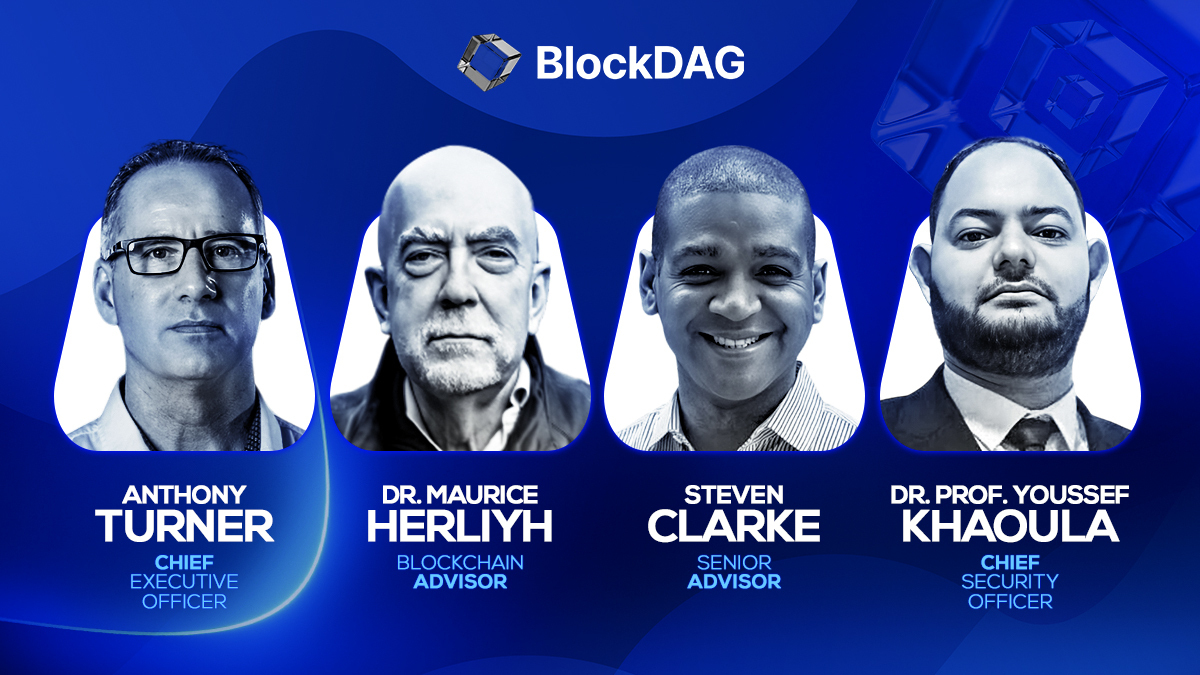
BlockDAG Network’s history is one of innovation, perseverance, and a vision to push the boundaries of blockchain technology. With Harvard alumni, tech moguls, and best-selling authors at the helm, BlockDAG is rewriting the rules of the cryptocurrency game.
CEO Antony Turner, inspired by the successes and shortcomings of Bitcoin and Ethereum, says, “BlockDAG leverages existing technology to push the boundaries of speed, security, and decentralization.” This powerhouse team has led a staggering 1,600% price increase in 20 pre-sale rounds, raising over $63.9 million. The secret? Unparalleled expertise and a bold vision for the future of blockchain.
Let’s dive into BlockDAG’s success story and find out what the future holds for this cryptocurrency.
The Origin: Why BlockDAG Was Created
In a recent interview, BlockDAG CEO Antony Turner perfectly summed up why the market needs BlockDAG’s ongoing revolution. He said:
“The creation of BlockDAG was inspired by Bitcoin and Ethereum, their successes and their shortcomings.
If you look at almost any new technology, it is very rare that the first movers remain at the forefront forever. Later incumbents have a huge advantage in entering a market where the need has been established and the technology is no longer cutting edge.
BlockDAG has done just that: our innovation is incorporating existing technology to provide a better solution, allowing us to push the boundaries of speed, security, and decentralization.”
The Present: How Far Has BlockDAG Come?
BlockDAG’s presale is setting new benchmarks in the cryptocurrency investment landscape. With a stunning 1600% price increase over 20 presale lots, it has already raised over $63.9 million in capital, having sold over 12.43 billion BDAG coins.
This impressive performance underscores the overwhelming confidence of investors in BlockDAG’s vision and leadership. The presale attracted over 20,000 individual investors, with the BlockDAG community growing exponentially by the hour.

These monumental milestones have been achieved thanks to the unparalleled skills, experience and expertise of BlockDAG’s management team:
Antony Turner – Chief Executive Officer
Antony Turner, CEO of BlockDAG, has over 20 years of experience in the Fintech, EdTech, Travel and Crypto industries. He has held senior roles at SPIRIT Blockchain Capital and co-founded Axona-Analytics and SwissOne. Antony excels in financial modeling, business management and scaling growth companies, with expertise in trading, software, IoT, blockchain and cryptocurrency.
Director of Communications
Youssef Khaoulaj, CSO of BlockDAG, is a Smart Contract Auditor, Metaverse Expert, and Red Team Hacker. He ensures system security and disaster preparedness, and advises senior management on security issues.
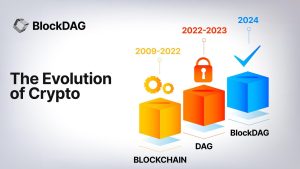
advisory Committee
Steven Clarke-Martin, a technologist and consultant, excels in enterprise technology, startups, and blockchain, with a focus on DAOs and smart contracts. Maurice Herlihy, a Harvard and MIT graduate, is an award-winning computer scientist at Brown University, with experience in distributed computing and consulting roles, most notably at Algorand.
The Future: Becoming the Cryptocurrency with the Highest Market Cap in the World
Given its impressive track record and a team of geniuses working tirelessly behind the scenes, BlockDAG is quickly approaching the $600 million pre-sale milestone. This crypto powerhouse will soon enter the top 30 cryptocurrencies by market cap.
Currently trading at $0.017 per coin, BlockDAG is expected to hit $1 million in the coming months, with the potential to hit $30 per coin by 2030. Early investors have already enjoyed a 1600% ROI by batch 21, fueling a huge amount of excitement around BlockDAG’s presale. The platform is seeing significant whale buying, and demand is so high that batch 21 is almost sold out. The upcoming batch is expected to drive prices even higher.

Invest in BlockDAG Pre-Sale Now:
Pre-sale: https://purchase.blockdag.network
Website: https://blockdag.network
Telegram: https://t.me/blockDAGnetwork
Discord: Italian: https://discord.gg/Q7BxghMVyu
No spam, no lies, just insights. You can unsubscribe at any time.
Tech
How Karak’s Latest Tech Integration Could Make Data Breaches Obsolete
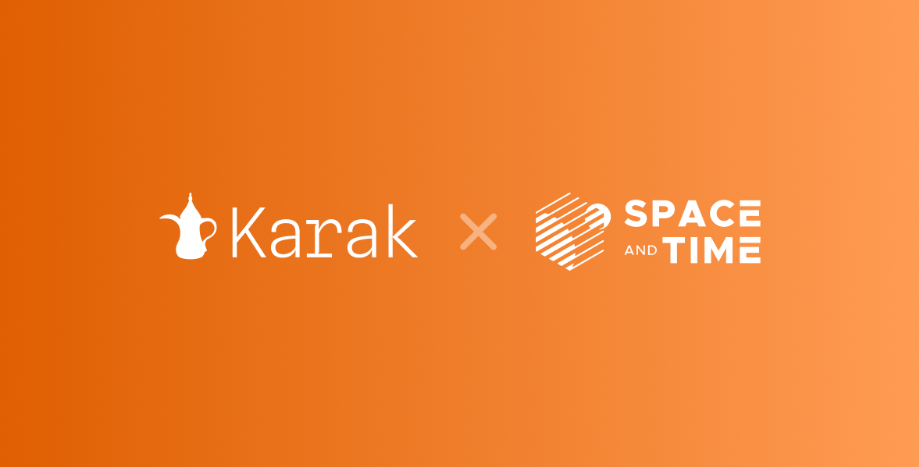
- Space and Time uses zero-knowledge proofs to ensure secure and tamper-proof data processing for smart contracts and enterprises.
- The integration facilitates faster development and deployment of Distributed Secure Services (DSS) on the Karak platform.
Karak, a platform known for its strong security capabilities, is enhancing its Distributed Secure Services (DSS) by integrating Space and Time as a zero-knowledge (ZK) coprocessor. This move is intended to strengthen trustless operations across its network, especially in slashing and rewards mechanisms.
Space and Time is a verifiable processing layer that uses zero-knowledge proofs to ensure that computations on decentralized data warehouses are secure and untampered with. This system enables smart contracts, large language models (LLMs), and enterprises to process data without integrity concerns.
The integration with Karak will enable the platform to use Proof of SQL, a new ZK-proof approach developed by Space and Time, to confirm that SQL query results are accurate and have not been tampered with.
One of the key features of this integration is the enhancement of DSS on Karak. DSS are decentralized services that use re-staked assets to secure the various operations they provide, from simple utilities to complex marketplaces. The addition of Space and Time technology enables faster development and deployment of these services, especially by simplifying slashing logic, which is critical to maintaining security and trust in decentralized networks.
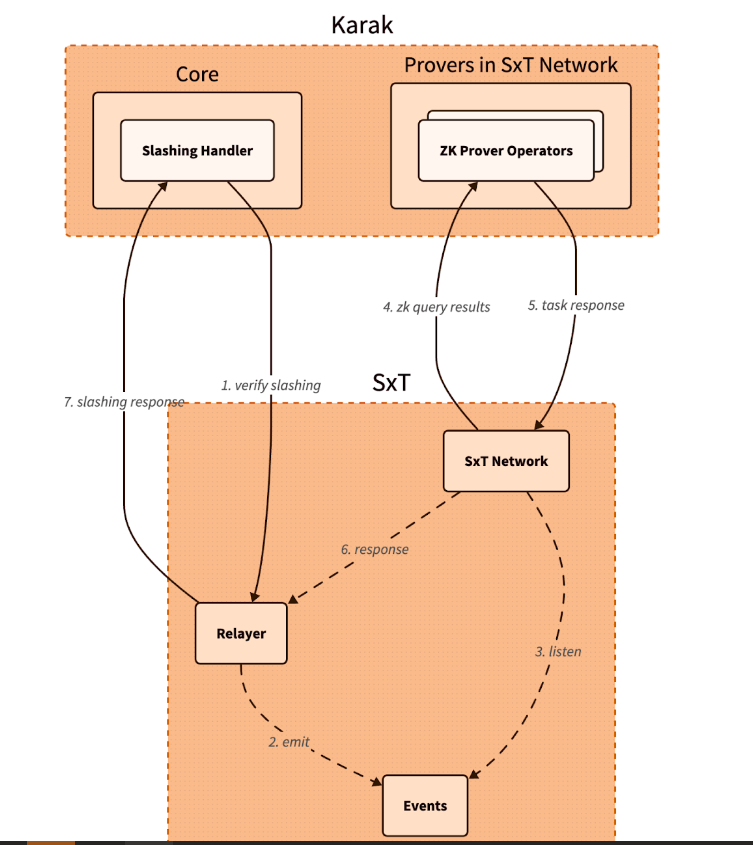
Additionally, Space and Time is developing its own DSS for blockchain data indexing. This service will allow community members to easily participate in the network by running indexing nodes. This is especially beneficial for applications that require high security and decentralization, such as decentralized data indexing.
The integration architecture follows a detailed and secure flow. When a Karak slashing contract needs to verify a SQL query, it calls the Space and Time relayer contract with the required SQL statement. This contract then emits an event with the query details, which is detected by operators in the Space and Time network.
These operators, responsible for indexing and monitoring DSS activities, validate the event and route the work to a verification operator who runs the query and generates the necessary ZK proof.
The result, along with a cryptographic commitment on the queried data, is sent to the relayer contract, which verifies and returns the data to the Karak cutter contract. This end-to-end process ensures that the data used in decision-making, such as determining penalties within the DSS, is accurate and reliable.
Karak’s mission is to provide universal security, but it also extends the capabilities of Space and Time to support multiple DSSs with their data indexing needs. As these technologies evolve, they are set to redefine the secure, decentralized computing landscape, making it more accessible and efficient for developers and enterprises alike. This integration represents a significant step towards a more secure and verifiable digital infrastructure in the blockchain space.
Website | X (Twitter) | Discord | Telegram
No spam, no lies, just insights. You can unsubscribe at any time.
Tech
Cryptocurrency Payments: Should CFOs Consider This Ferrari-Approved Trend?

Iconic Italian luxury carmaker Ferrari has announced the expansion of its cryptocurrency payment system to its European dealer network.
The move, which follows a successful launch in North America less than a year ago, raises a crucial question for CFOs across industries: Is it time to consider accepting cryptocurrency as a form of payment for your business?
Ferrari’s move isn’t an isolated one. It’s part of a broader trend of companies embracing digital assets. As of 2024, we’re seeing a growing number of companies, from tech giants to traditional retailers, accepting cryptocurrencies.
This change is determined by several factors:
- Growing mainstream adoption of cryptocurrencies
- Growing demand from tech-savvy and affluent consumers
- Potential for faster and cheaper international transactions
- Desire to project an innovative brand image
Ferrari’s approach is particularly noteworthy. They have partnered with BitPay, a leading cryptocurrency payment processor, to allow customers to purchase vehicles using Bitcoin, Ethereum, and USDC. This satisfies their tech-savvy and affluent customer base, many of whom have large digital asset holdings.
Navigating Opportunities and Challenges
Ferrari’s adoption of cryptocurrency payments illustrates several key opportunities for companies considering this move. First, it opens the door to new customer segments. By accepting cryptocurrency, Ferrari is targeting a younger, tech-savvy demographic—people who have embraced digital assets and see them as a legitimate form of value exchange. This strategy allows the company to connect with a new generation of affluent customers who may prefer to conduct high-value transactions in cryptocurrency.
Second, cryptocurrency adoption increases global reach. International payments, which can be complex and time-consuming with traditional methods, become significantly easier with cryptocurrency transactions. This can be especially beneficial for businesses that operate in multiple countries or deal with international customers, as it potentially reduces friction in cross-border transactions.
Third, accepting cryptocurrency positions a company as innovative and forward-thinking. In today’s fast-paced business environment, being seen as an early adopter of emerging technologies can significantly boost a brand’s image. Ferrari’s move sends a clear message that they are at the forefront of financial innovation, which can appeal to customers who value cutting-edge approaches.
Finally, there is the potential for cost savings. Traditional payment methods, especially for international transactions, often incur substantial fees. Cryptocurrency transactions, on the other hand, can offer lower transaction costs. For high-value purchases, such as luxury cars, these savings could be significant for both the business and the customer.
While the opportunities are enticing, accepting cryptocurrency payments also presents significant challenges that businesses must address. The most notable of these is volatility. Cryptocurrency values can fluctuate dramatically, sometimes within hours, posing potential risk to businesses that accept them as payment. Ferrari addressed this challenge by implementing a system that instantly converts cryptocurrency received into traditional fiat currencies, effectively mitigating the risk of value fluctuations.
Regulatory uncertainty is another major concern. The legal landscape surrounding cryptocurrencies is still evolving in many jurisdictions around the world. This lack of clear and consistent regulations can create compliance challenges for companies, especially those operating internationally. Companies must remain vigilant and adaptable as new laws and regulations emerge, which can be a resource-intensive process.
Implementation costs are also a significant obstacle. Integrating cryptocurrency payment systems often requires substantial investment in new technology infrastructure and extensive staff training. This can be especially challenging for small businesses or those with limited IT resources. The costs are not just financial; a significant investment of time is also required to ensure smooth implementation and operation.
Finally, security concerns loom large in the world of cryptocurrency transactions. While blockchain technology offers some security benefits, cryptocurrency transactions still require robust cybersecurity measures to protect against fraud, hacks, and other malicious activity. Businesses must invest in robust security protocols and stay up-to-date on the latest threats and protections, adding another layer of complexity and potential costs to accepting cryptocurrency payments.
Strategic Considerations for CFOs
If you’re thinking of following in Ferrari’s footsteps, here are the key factors to consider:
- Risk Assessment: Carefully evaluate potential risks to your business, including financial, regulatory, and reputational risks.
- Market Analysis: Evaluate whether your customer base is significantly interested in using cryptocurrencies for payments.
- Technology Infrastructure: Determine the costs and complexities of implementing a cryptographic payment system that integrates with existing financial processes.
- Regulatory Compliance: Ensure that cryptocurrency acceptance is in line with local regulations in all markets you operate in. Ferrari’s gradual rollout demonstrates the importance of this consideration.
- Financial Impact: Analyze how accepting cryptocurrency could impact your cash flow, accounting practices, and financial reporting.
- Partnership Evaluation: Consider partnering with established crypto payment processors to reduce risk and simplify implementation.
- Employee Training: Plan comprehensive training to ensure your team is equipped to handle cryptocurrency transactions and answer customer questions.
While Ferrari’s adoption of cryptocurrency payments is exciting, it’s important to consider this trend carefully.
A CFO’s decision to adopt cryptocurrency as a means of payment should be based on a thorough analysis of your company’s specific needs, risk tolerance, and strategic goals. Cryptocurrency payments may not be right for every business, but for some, they could provide a competitive advantage in an increasingly digital marketplace.
Remember that the landscape is rapidly evolving. Stay informed about regulatory changes, technological advancements, and changing consumer preferences. Whether you decide to accelerate your crypto engines now or wait in the pit, keeping this payment option on your radar is critical to navigating the future of business transactions.
Was this article helpful?
Yes No
Sign up to receive your daily business insights
Tech
Bitcoin Tumbles as Crypto Market Selloff Mirrors Tech Stocks’ Plunge
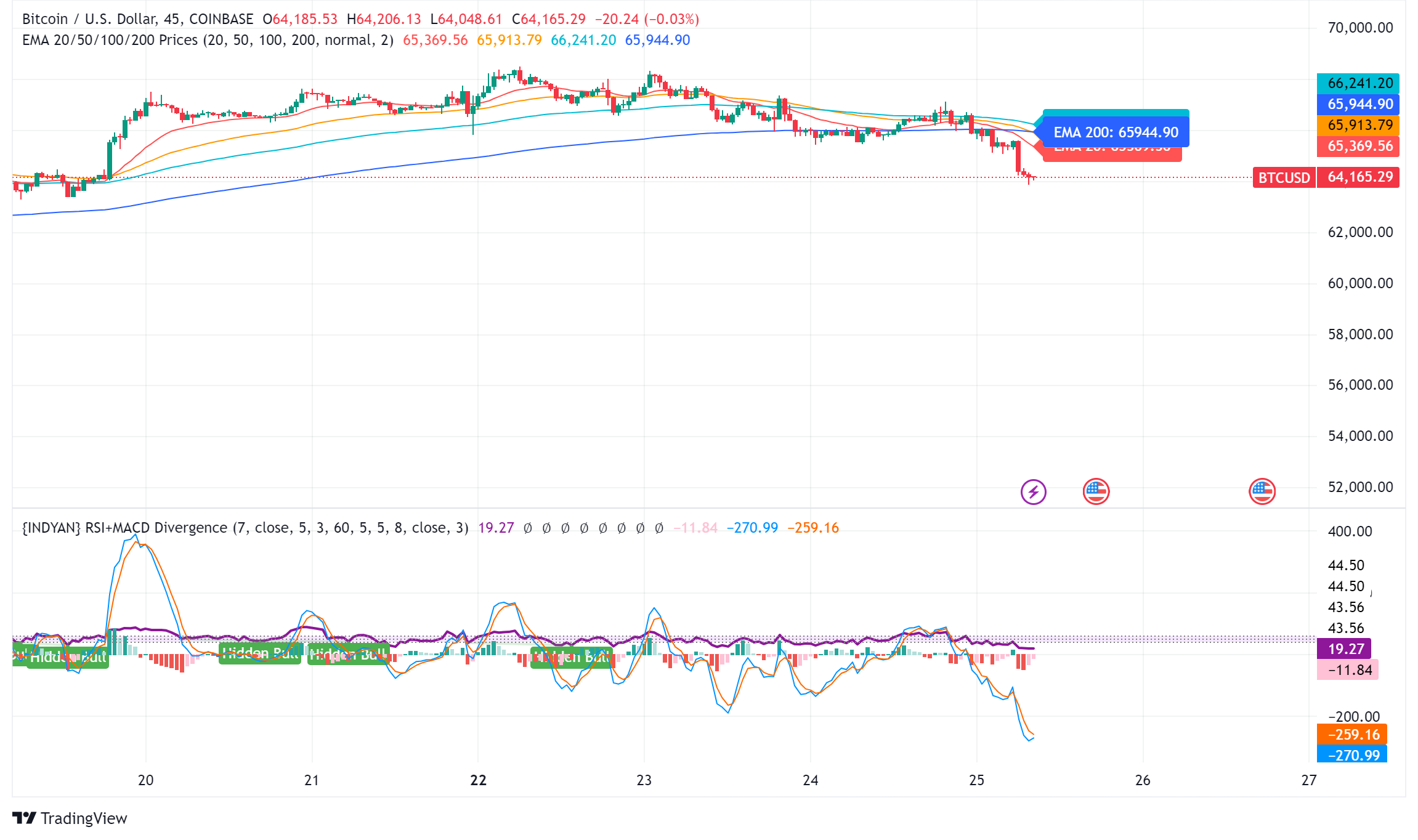
The world’s largest cryptocurrency, Bitcoin (BTC), suffered a significant price decline on Wednesday, falling below $65,000. The decline coincides with a broader market sell-off that has hit technology stocks hard.
Cryptocurrency Liquidations Hit Hard
CoinGlass data reveals a surge in long liquidations in the cryptocurrency market over the past 24 hours. These liquidations, totaling $220.7 million, represent forced selling of positions that had bet on price increases. Bitcoin itself accounted for $14.8 million in long liquidations.
Ethereum leads the decline
Ethereal (ETH), the second-largest cryptocurrency, has seen a steeper decline than Bitcoin, falling nearly 8% to trade around $3,177. This decline mirrors Bitcoin’s price action, suggesting a broader market correction.
Cryptocurrency market crash mirrors tech sector crash
The cryptocurrency market decline appears to be linked to the significant losses seen in the U.S. stock market on Wednesday. Stock market listing The index, heavily weighted toward technology stocks, posted its sharpest decline since October 2022, falling 3.65%.
Analysts cite multiple factors
Several factors may have contributed to the cryptocurrency market crash:
- Tech earnings are underwhelming: Earnings reports from tech giants like Alphabet are disappointing (Google(the parent company of), on Tuesday, triggered a sell-off in technology stocks with higher-than-expected capital expenditures that could have repercussions on the cryptocurrency market.
- Changing Political Landscape: The potential impact of the upcoming US elections and changes in Washington’s policy stance towards cryptocurrencies could influence investor sentiment.
- Ethereal ETF Hopes on the line: While bullish sentiment around a potential U.S. Ethereum ETF initially boosted the market, delays or rejections could dampen enthusiasm.
Analysts’ opinions differ
Despite the short-term losses, some analysts remain optimistic about Bitcoin’s long-term prospects. Singapore-based cryptocurrency trading firm QCP Capital believes Bitcoin could follow a similar trajectory to its post-ETF launch all-time high, with Ethereum potentially converging with its previous highs on sustained institutional interest.
Rich Dad Poor Dad Author’s Prediction
Robert Kiyosaki, author of the best-selling Rich Dad Poor Dad, predicts a potential surge in the price of Bitcoin if Donald Trump is re-elected as US president. He predicts a surge to $105,000 per coin by August 2025, fueled by a weaker dollar that is set to boost US exports.
BTC/USD Technical Outlook
Bitcoin price is currently trading below key support levels, including the $65,500 level and the 100 hourly moving average. A break below the $64,000 level could lead to further declines towards the $63,200 support zone. However, a recovery above the $65,500 level could trigger another increase in the coming sessions.
-

 News10 months ago
News10 months agoVolta Finance Limited – Director/PDMR Shareholding
-

 News10 months ago
News10 months agoModiv Industrial to release Q2 2024 financial results on August 6
-

 News10 months ago
News10 months agoApple to report third-quarter earnings as Wall Street eyes China sales
-

 News10 months ago
News10 months agoNumber of Americans filing for unemployment benefits hits highest level in a year
-

 News1 year ago
News1 year agoInventiva reports 2024 First Quarter Financial Information¹ and provides a corporate update
-

 News1 year ago
News1 year agoLeeds hospitals trust says finances are “critical” amid £110m deficit
-

 DeFi1 year ago
DeFi1 year ago🏴☠️ Pump.Fun operated by Insider Exploit
-

 Tech1 year ago
Tech1 year agoBitcoin’s Correlation With Tech Stocks Is At Its Highest Since August 2023: Bloomberg ⋆ ZyCrypto
-

 Tech1 year ago
Tech1 year agoEverything you need to know
-

 Markets12 months ago
Markets12 months ago20 Top Crypto Trading Platforms to Know
-

 News10 months ago
News10 months agoStocks wobble as Fed delivers and Meta bounces
-

 Markets1 year ago
Markets1 year agoWhale Investments in Bitcoin Hit $100 Billion in 2024, Fueling Insane Investor Optimism ⋆ ZyCrypto












